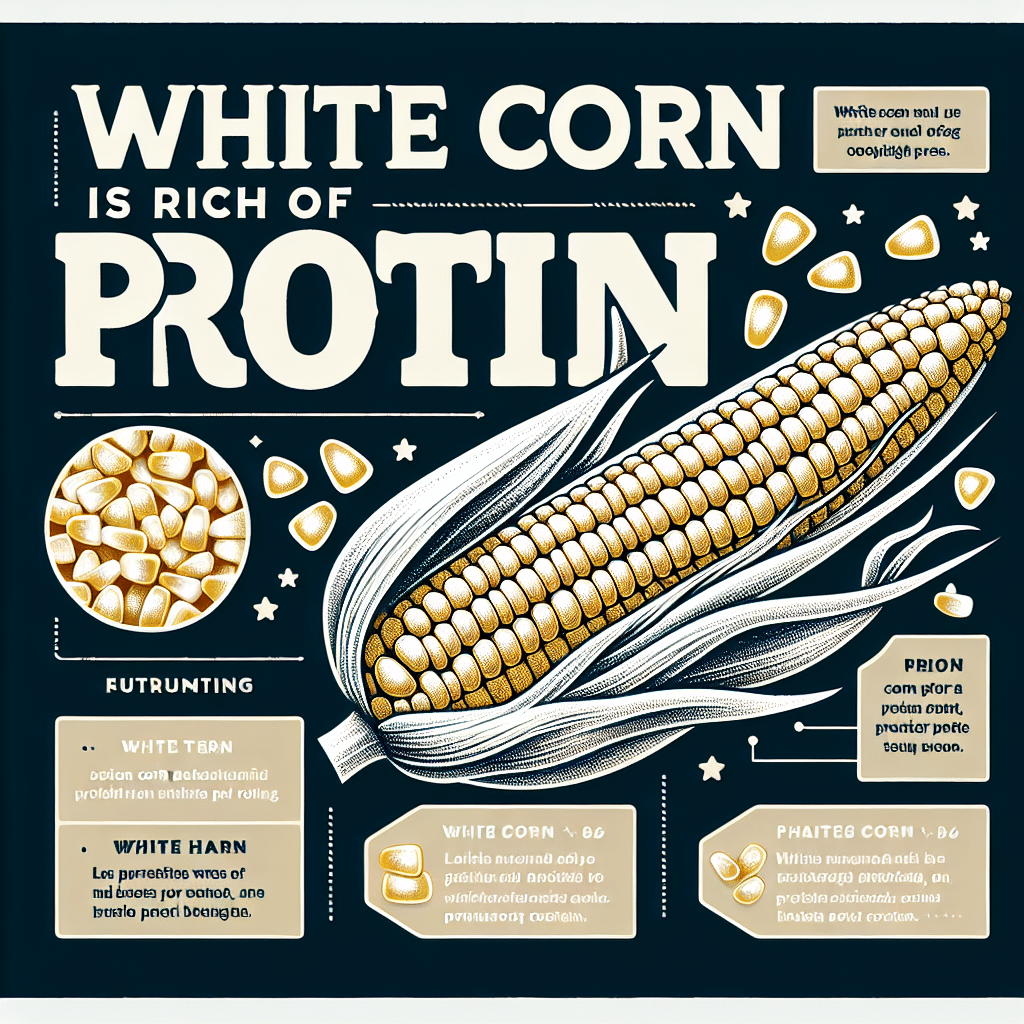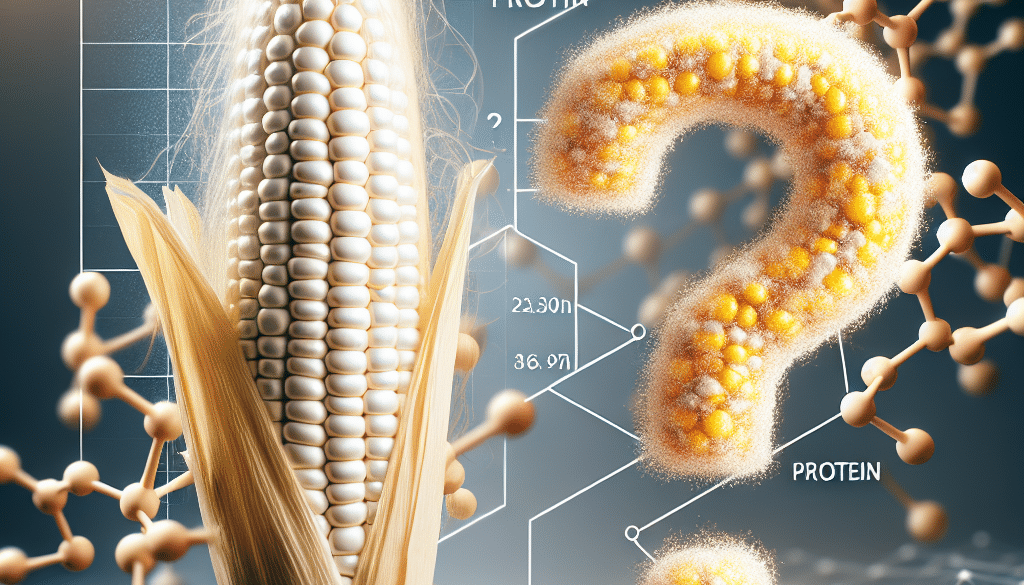Is White Corn Rich In Protein?
-
Table of Contents
- White Corn Protein Content: A Comprehensive Analysis
- Understanding White Corn and Its Nutritional Profile
- Is White Corn a Good Source of Protein?
- Comparing White Corn Protein to Other Grains
- White Corn in a Protein-Rich Diet
- Case Studies and Research on Corn Protein
- White Corn and Overall Health
- Conclusion: The Role of White Corn in Your Diet
- Discover ETprotein’s High-Quality Protein Products
White Corn Protein Content: A Comprehensive Analysis

White corn, a staple food in many parts of the world, is often celebrated for its versatility and nutritional benefits. One of the key questions that health-conscious consumers and fitness enthusiasts ask is whether white corn is a good source of protein. In this article, we delve into the protein content of white corn, compare it with other grains, and explore its role in a balanced diet.
Understanding White Corn and Its Nutritional Profile
White corn, also known as maize, is a cereal grain that originates from the Americas. It has been a fundamental food source for centuries, owing to its adaptability to various climates and soil types. White corn is consumed in various forms, including fresh, frozen, canned, and as a processed product like cornmeal or corn flour.
When it comes to nutrition, white corn is known for its carbohydrate content, which provides energy. It also contains vitamins and minerals such as vitamin B6, niacin, pantothenic acid, folate, magnesium, and phosphorus. However, the focus of this article is on its protein content.
Is White Corn a Good Source of Protein?
Protein is an essential macronutrient required for building and repairing tissues, making enzymes and hormones, and supporting overall health. The protein content in white corn is modest when compared to other protein-rich foods. On average, white corn contains about 3.3 grams of protein per 100 grams of serving. While this amount is not negligible, it is not as high as other protein sources such as meat, dairy, legumes, or nuts.
Comparing White Corn Protein to Other Grains
When assessing the protein content of white corn, it’s helpful to compare it with other grains. Here’s a brief comparison:
- Quinoa: Quinoa is often hailed as a superfood due to its high protein content, which is about 14 grams per 100 grams.
- Brown Rice: Brown rice provides around 2.6 grams of protein per 100 grams, slightly less than white corn.
- Wheat: Whole wheat flour contains about 13 grams of protein per 100 grams, making it a richer source of protein than white corn.
While white corn does not top the list of grains in terms of protein content, it can still contribute to the overall protein intake when consumed as part of a varied diet.
White Corn in a Protein-Rich Diet
For individuals looking to increase their protein intake, white corn can be included in a diet that also features higher-protein foods. Here are some ways to incorporate white corn into a protein-rich diet:
- Pairing white corn with beans or legumes, which are high in protein, to create a complete protein source with all essential amino acids.
- Including a serving of white corn alongside lean meats or fish to boost the meal’s overall protein content.
- Using white corn as a base for salads and adding nuts, seeds, or cheese for additional protein.
Case Studies and Research on Corn Protein
Several studies have investigated the protein quality and potential health benefits of corn. For instance, research has shown that the protein in corn is rich in the amino acid leucine, which is important for muscle synthesis and recovery. However, corn protein is deficient in lysine and tryptophan, which are essential amino acids that the body cannot produce on its own.
Another study has highlighted the potential of corn as a gluten-free protein source for people with celiac disease or gluten intolerance. The research suggests that corn protein, particularly zein (a major storage protein in corn), could be used to develop gluten-free products.
White Corn and Overall Health
While white corn may not be a protein powerhouse, it still offers health benefits. Its fiber content aids in digestion, and its antioxidants, such as lutein and zeaxanthin, support eye health. Moreover, white corn is a whole grain, which has been linked to a lower risk of chronic diseases such as heart disease and type 2 diabetes.
Conclusion: The Role of White Corn in Your Diet
In conclusion, white corn is not particularly rich in protein, but it can still be part of a balanced diet that includes a variety of protein sources. Its nutritional benefits, along with its versatility in cooking, make it a valuable addition to meals. For those looking to increase their protein intake, it’s important to complement white corn with other high-protein foods.
Discover ETprotein’s High-Quality Protein Products
If you’re seeking additional protein sources to complement your diet, consider exploring ETprotein’s range of organic bulk vegan proteins. ETprotein offers a variety of plant-based proteins, including rice protein, pea protein, and seed proteins, which can be excellent additions to your nutritional regimen.
About ETprotein:
ETprotein, a reputable protein and L-(+)-Ergothioneine (EGT) Chinese factory manufacturer and supplier, is renowned for producing, stocking, exporting, and delivering the highest quality organic bulk vegan proteins and L-(+)-Ergothioneine. They include Organic rice protein, clear rice protein, pea protein, clear pea protein, watermelon seed protein, pumpkin seed protein, sunflower seed protein, mung bean protein, peanut protein, and L-(+)-Ergothioneine EGT Pharmaceutical grade, L-(+)-Ergothioneine EGT food grade, L-(+)-Ergothioneine EGT cosmetic grade, L-(+)-Ergothioneine EGT reference grade and L-(+)-Ergothioneine EGT standard. Their offerings, characterized by a neutral taste, non-GMO, allergen-free attributes, with L-(+)-Ergothioneine purity over 98%, 99%, cater to a diverse range of industries. They serve nutraceutical, pharmaceutical, cosmeceutical, veterinary, as well as food and beverage finished product distributors, traders, and manufacturers across Europe, USA, Canada, Australia, Thailand, Japan, Korea, Brazil, and Chile, among others.
ETprotein specialization includes exporting and delivering tailor-made protein powder and finished nutritional supplements. Their extensive product range covers sectors like Food and Beverage, Sports Nutrition, Weight Management, Dietary Supplements, Health and Wellness Products, and Infant Formula, ensuring comprehensive solutions to meet all your protein needs.
As a trusted company by leading global food and beverage brands and Fortune 500 companies, ETprotein reinforces China’s reputation in the global arena. For more information or to sample their products, please contact them and email sales(at)ETprotein.com today.












